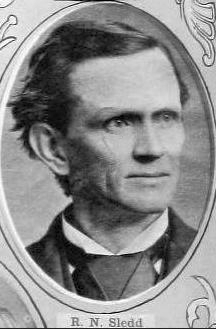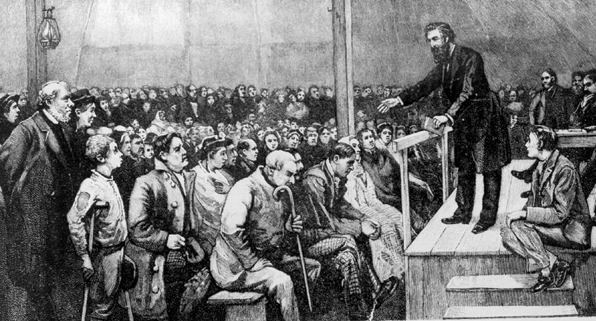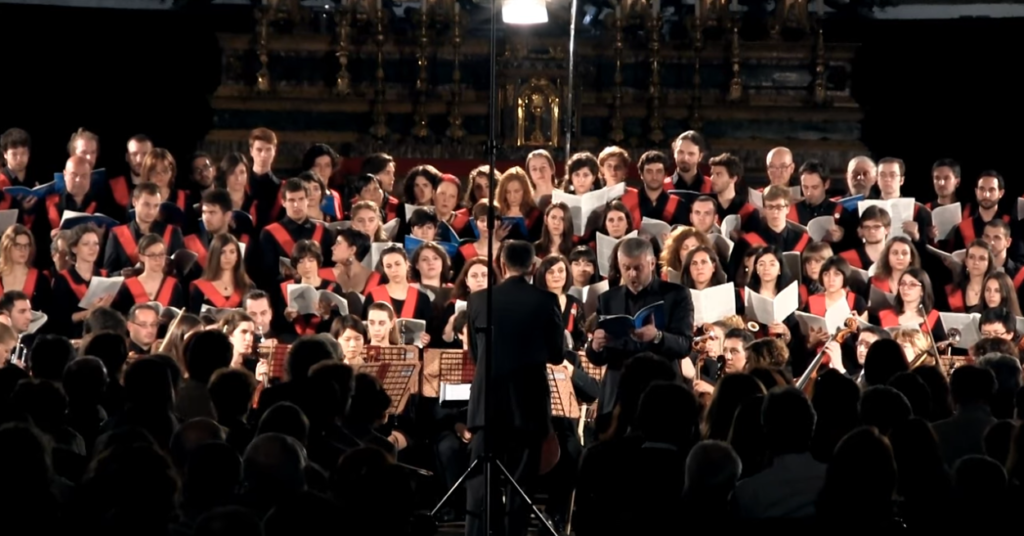Editor’s note: The following is extracted from True Heroism and Other Sermons, by R. N. Sledd (published 1899).
“Holding forth the word of life.” — Phil. ii, 16.
It is interesting to note the variety of names given to the gospel of Christ. It is called a word; it is the mind of God concerning our race expressed in human speech. It is a “word of righteousness;” righteous in itself, it is a revelation of the righteousness of God, and of the means whereby men may become righteous. It is a “word of reconciliation;” it is a record of God’s method of reconciling the world unto himself and an offer of reconciliation and peace to men alienated from him and in rebellion against him. It is a “word of truth,” as compared with the shadows of the preceding dispensation, and as contrasted with all other systems of religious belief. It is a “word of faith,” as contrasted with legalism, naturalism and rationalism in all their forms, whether ancient or modern. It is a “word of salvation,” it lifts man up from his degradation, liberates him from the bondage of corruption, and fits him for his position, work and destiny as a moral being. It translates him into the kingdom of God, manifests the life of Jesus in his moral flesh, and verifies, in his experience the apparent paradox, “I am crucified with Christ, nevertheless I live.” It saves him from the guilt, pollution, and power of sin in this life and from all its consequences in the life to come.
In the text the gospel is called “the word of life,” an expression suggestive of some of the most precious truths of our holy religion. To unfold its meaning, and to render as prominent as possible our duty in relation to it is our present purpose.
I. THE GOSPEL IS A REVELATION OF LIFE.
There is no profounder mystery than life. It fills the universe. Its forms are endlessly varied. Its productions are marvelously exuberant. But what is it? What is its essential principle? Who of all the wise men of the world has ever been able to answer this question? Science has taxed its resources to the utmost in the effort to discover its origin. For some time the purely natural school was disposed to rest in the theory of spontaneous generation. But it was a theory unsupported by facts, and therefore unscientific. It has accordingly been rejected with the recorded admission that “no shred of trustworthy experimental testimony exists to prove that life in our day has ever appeared independently of antecedent life.” With this admission, Science has no solution of the mystery. Revelation solves the problem at once by ascribing life directly to the omnific energy of God as uttered by the eternal Son. “He spake and it was done” — all things animate and inanimate began to be. On the word of His power its perpetuity depends, for “by Him all things consist.” Let the energy of that word be suspended or withdrawn, and all life and being would come to a perpetual end.
But there is a life which is not the product of creative power. This is the life of the soul of which God is the Fountain rather than the Creator, and of which moral beings partake by impartation. It is not the product of culture, or of some peculiar combination of natural forces, or only a higher and more perfect development of the natural life; but it is the direct gift of God imparted in the work of the Holy Ghost. This life God breathed into Adam in Eden. It was this that Adam lost by transgression, and that can be recovered only by a new birth unto righteousness.
It is of this, higher, grander life, which reunites us to God and makes us one with Him, and in Him one with all virtuous intelligences, that the apostle speaks in the text. To make men partakers of this life is the design of the word; to the accomplishment of this end all its parts have been adapted by its Author.
“I am come,” said Jesus Christ, “that they might have life and that they might have it more abundantly.” John calls Him “the word of life,” and says, “God has given to us eternal life, and this life is in His Son.” The word testifies of him. He is its Alpha and Omega. It is the record of His love, the history of His mediatorial work.
When the redemptive scheme originated we know not. The purpose to redeem must have been coeval with the purpose to create, and creation must have proceeded on the redemptive principle. The effective operation of the scheme began the moment there was need for it in the history of man. The instant of his transgression marked the beginning of the reign of grace. Before old Eden was left, the seed of the woman was promised and the hope of a new Paradise awakened. All subsequent revelation was but the unfolding of that promise — each successive stage of its development in type and prophecy disclosing more clearly the significance of the promise and the method and results of its fulfillment.
In the New Testament prophecy and promise become history. The Son of God has come. He comes to men as a man, but brings with Him the credentials of a God. Entering into their employments, and into their houses, and reclining with them at their tables, and participating in their festive joys as well as in their sorrows, He teaches what it is to live, and how to live in the deepest, truest, broadest sense. “Life is a burden to be borne with meekness and patience,” says Buddhism, “and eternal unconciousness is the highest reward of virtue.” “Life is the precious gift of an infinitely loving Father,” says Christ, “and finds its only true expression in a joyous, loving spirit towards God and all that God has made.” We sing, “There is a life above, unmeasured by the flight of years, and all that life is love.” Christ teaches that the true life on earth, no less than that in heaven, has its inspiration, its flowering and fruitage in love. No one knows the bliss of being until the bands of selfishness have been broken and his nature attuned to those sweet harmonies of which the heart-throb of the all-loving Father is the key-note.
But while in His life and teaching He bears witness to this great truth, its realization in human experience is impossible unless guilt be canceled and the heart be cleansed. In order to this there must be expiation. The character and government of God require it. The moral constitution of man demands it. Conscience emphasizes its necessity and will not be satisfied without it. To meet all conditions and demands, human and divine, Christ “through the eternal spirit offered Himself without spot to God;” and after “He had offered one sacrifice for sins forever, He sat down on the right hand of God, from henceforth expecting ’till His enemies be made His footstool.”
In this great transaction He has “abolished death and brought life and immortality to light.” In view of His vicarious death God can “be just, and the justifier of him which believeth in Jesus.” In justification, or pardon, our disabilities are removed; we are restored to citizenship; we have legal life. By His intercession He secures for us the gift of the Holy Ghost, by whom we are “renewed in righteousness and true holiness after the image of Him that created us.” In this renewal or regeneration we have spiritual life. That which which Adam lost is thus regained in Christ. The soul is united to Him as the branch to the vine, partakes of His life, and is filled with His peace. This spiritual resurrection is the earnest of “the adoption, to wit, the redemption of our body.” Death is the consummation of the curse of the body. In it Satan and sin reach the climax of their power. But the same almighty love that redeemed the soul has redeemed the body also, and has given the pledge of its complete emancipation from the corruption and dishonor of the grave. “He must reign until He hath put all enemies under His feet. The last enemy that shall be destroyed is death.” With its destruction “this corruptible shall put on incorruption, and this mortal shall put on immortality.” Soul and body reunited and alike glorified in the image of Christ, and in a glorified world, shall know the bliss and “power of an endless life.”
II. THE GOSPEL IS AN OFFER OF LIFE.
Such a revelation has not been made merely as a mockery of human helplessness and woe. The light has not been thrown into the dungeon only to reveal to the wretched inmate the loathsomeness of his surroundings; nor is he permitted to look out through the bars on a world of brightness and beauty only to intensify his despair. But all the light, life, and love of the word are intended specially for him — for his personal appropriation and enjoyment. There is nothing in the gospel that is merely theoretical; nothing the aim of which is to attract by its novelty, or to gratify a vain curiosity; nothing that does not meet some felt necessity of the soul. But in it is all that man does need. Its provisions are as varied as his wants and as boundless as the “unsearchable riches of Christ.” And it offers all the good it reveals. The offer is honest, earnest, impartial. It is made in every variety of form, and through every available instrumentality. Every Bible that issues from the press, every gospel sermon, every holy life and triumphant death, repeats from age to age the story of His love and the offer of His grace. Isaiah struck the key-note when he cried: “Ho, every one that thirsteth, come ye to the waters, and he that hath no money; come ye; buy, and eat; yea, come, buy wine and milk without money and without price.” The Saviour, with an infinite pathos, repeats the invitation and promise: “Come unto Me, all ye that labor and are heavy laden, and I will give you rest.” Well-nigh His last words to the world are: “The spirit and the bride say, Come. Let him that heareth say, Come. Let him that is athirst come. And whoso ever will, let him take the water of life freely.” The water of life — the bread of life! Drink of the water of Jacob’s well, emblem of all the fountains of worldly joy, and you will thirst again. Eat at the tables spread by human vanity and self-sufficiency, or intellectual pride and assumption and you will hunger again. But “he that cometh to Me shall never hunger, and he that believeth on Me shall never thirst.”
III. THE GOSPEL IMPARTS AND SUSTAINS LIFE.
God has fitted the word to the needs of the spiritual nature just as He has fitted food to the needs of the body. When the word is “mixed with faith in them that hear it,” their nourishment and growth follow as certainly as the body acquires and retains vigor and strength from the healthful digestion of nutritious food. Hence the exhortation of Peter: “As new-born babes, desire the sincere milk of the word, that ye may grow thereby: if so be ye have tasted that the Lord is gracious.”
The word is the channel through which divine influences are communicated to the soul. “Sanctify them through Thy truth; Thy word is truth.” “Of His own will begat He us with the word of truth.” “That He might sanctify and cleanse the Church with the washing of water by the word.” We do not question the doctrine of the immediate influence of the Holy Spirit on human hearts. But we affirm with emphasis His mediate operation, and that the medium through which or the instrument with which He ordinarily works is the word of truth.
While God inspired holy men of old to speak and write the truth, He also inspired the truth itself. His inspiration of the men saved them from error in the delivery of the truth, while His inspiration of the truth gave it its exhaustless vitality and world-saving energy. Men often put themselves in the productions of their intellects so completely that as we read we seem almost to realize their living presence. We feel the power of their genius, the force of their will, the glow of their sensibilities. In a far deeper, truer sense God, the Holy Ghost, is in the word which He has given. His presence fills it and imparts to it that marvelous reproductive power of which His spiritual church is the offspring. We thought it bold rhetoric when we heard a celebrated preacher say, speaking of the word: “Touch that word with reverence, for God is in it! It is instinct with His presence, His life, his power! Lay upon it the hand of faith and you will almost feel the pulsation of His Father heart.” But underneath the rhetoric there is a substratum of precious truth. God is in the word. To receive the word is to receive Him. To have the word abiding us is to have Christ in us, “the hope of glory,” and to have Him in us is to have eternal life.
In this living word — living because God is in it — is the life of the Church and of every believing soul. Not more surely will the body, deprived of food, pine and perish, than will the spiritual life wane and vanish unless constantly sustained and renewed by the word of faith. God could threaten no heavier judgment on Israel than when He said: “Behold, the days come that I will send a famine in the land, not a famine of bread, nor a thirst for water, but of hearing the words of the Lord; and they shall wander from sea to sea, and from the north even to the east; they shall run to and fro to seek the word of the Lord and shall not find it.” Better, a thousand times better, a famine of bread than a famine of the word! The bread sustains the life of that which at best is perishable; the word sustains the spiritual life of that which is imperishable, the soul.
In the life-giving power of the word is the hope of our race. The history of the world demonstrates the inability of all other agencies to arrest depravity in its work of moral deterioration and wickedness, break the chains of vicious habit, and inspire men with the love of purity and goodness. The philosophies of the ancient schools were magnificent exhibitions of intellectual acumen and power; those of the present day are no less grandly conceived and wisely adjusted. As systems of human thought they must ever command the highest admiration. But they do not, cannot touch, far less renovate the moral character of man. Their light may shine forever on spiritually dead humanity without starting a single throb of life. So, too, of the religious of paganism. They are powerless at the very point where power is needed most and at which failure is fatal. Instead of renewing and elevating they sensualize, imbrute, and destroy their votaries. Instead of life they bring forth death. Equally impotent is the gospel of culture — the arrogant and empty boast of a godless naturalism. It rests on the assumption that there is the ability of self-regeneration in humanity. Whereas, as the word of God and the history of the ages prove, man is “utterly unable to recover himself, or take one step towards his recovery, without the grace of God preventing him that he may have a good will, and working with him when he has that good will.” There is in him no germ or seed of good which by culture can be developed into the spiritual man. Add to these all other conceivable forces — science, art, literature, oratory, material wealth, military power, statesmanship — combine and concentrate all their influences on a single soul, and they fail to awaken the faintest pulsation of spiritual life. They lift no part of the burden from an awakened conscience; they cannot cleanse the soul from the slightest stain, nor kindle any light of holy, restful hope in the despairing spirit. No assuring answer can they give to the thrilling question, “What must I do to be saved?” Miserable comforters are they all.
But the gospel of Christ, profound enough for the sage, simple enough for the child, little enough to enter the narrowest soul, broad enough to embrace in the mighty sweep of its love all the earth through all its generations, “is the power of God unto salvation to every one that believeth.” It breaks down cherished prejudices, subdues rebellion, destroys enmity, opens the prison and breaks the chains of them that are bound, binds up the broken heart, and gives to them that mourn beauty for ashes, the oil of joy for mourning, and the garment of praise for the spirit of heaviness. It saves the individual. It lifts him into a higher life. It makes him wiser, holier, happier. It supplies him with all necessary impulse, motive, and strength for a career of usefulness and goodness. At the same time it awakens within him sympathies as wide as the race, and a longing that “the arms of love that compass him might all mankind embrace.” Out of this philanthropy, born of the gospel, have come all those beneficent enterprises that look to the temporal as well as the moral and spiritual welfare of men. These have multiplied until we have a vast machinery of organized charities spreading its network of kindly influences over all Christian lands and into the “regions beyond.”
Thus while the gospel is a word of life to the individual soul it is the basis and bond of home, of society, of good government, and the inspiration of those wonderful benevolent activities that are hastening, as never before, the fulfillment of the prophetic testimony: “The wilderness and the solitary place shall be glad for them; and the desert shall rejoice and blossom as the rose.”
IV. OUR DUTY.
One duty with respect to this word of life is to hold it forth. As believers we have experienced its power, we partake of its life. Its light is in our souls. Let not the light be hidden under a bushel. Put it on the candlestick of a consistent, earnest Christian life, “that men may see your good works, and glorify your Father which is in heaven.” Men of the world, for the most part, do not read the word. Their gospel is the life of professing Christians. From them they receive their views and impressions of the truth and power of Christianity. An inconsistent life has given birth to many a doubt, and has been the stumbling-block over which many have fallen into ruin. Therefore, “walk worthy of the vocation wherewith ye are called, with all lowliness and meekness, with long-suffering, forbearing one another in love; endeavoring to keep the unity of the Spirit in the bond of peace.”
To hold it forth effectively it must be grasped with a firm and steady hand. There must be an unfaltering faith in it as the truth of God as the only but all-sufficient remedy for human woe. To be steadfast and unmovable in the face of the scoffs of unbelief, and the cavils of philosophy and vain deceit, and the prevailing spirit of irreligion and worldliness is a great achievement of grace; but it is an achievement essential both to our personal spiritual prosperity and to our efficiency as workers together with God. Doubt will paralyze our spiritual forces. A heart not fixed in God, not “rooted and grounded in love,” will give no bloom of spiritual beauty to the cheek, no luscious inviting fruits to the life. “As ye have therefore received, Christ Jesus the Lord, so walk ye in Him: rooted and built up in Him, and established in the faith as ye have been taught, abounding therein with thanksgiving.”
The duty is the more urgent because of the activity of the adversary. He has his emissaries in every walk of life. In the workshop, the counting-room, the factory, the office, in every social gathering, in the school, in the home; everywhere and always are they at work; by every art known the father of lies, they are seeking to ensnare the unwary and lure them from the path of purity and safety. The light of the word of life alone will discover to them the cheat and save them from the wiles of the devil. Hold it forth.
It is a joy to know that, whatever may be said of the prevalence of unbelief, the Christian faith has never been more vigorous, more active, and more fruitful that at the present time. Never was the gospel making more rapid strides or achieving grander results. Let the followers of Christ measure up to the opportunities and demands of the hour, and ere long all the nations will feel the quickening, saving power of the word of life.











This is a sound teaching as I read about God’s Word. It has great significance to me as a believer as well as those who have not yet believed and surrendered their lives to God. Thanks for sharing these sacred truths.